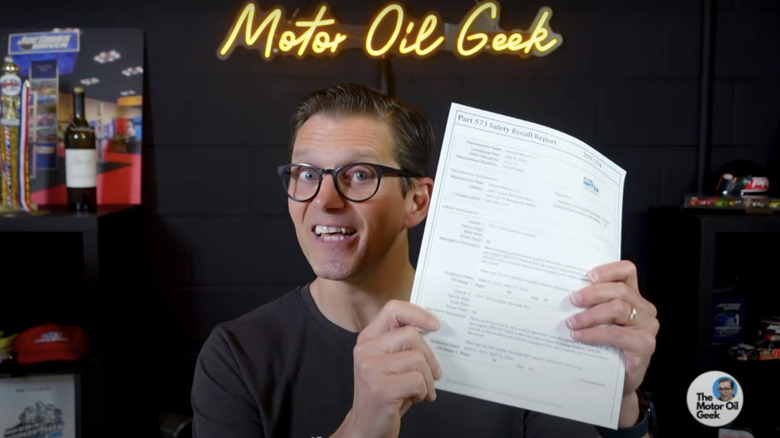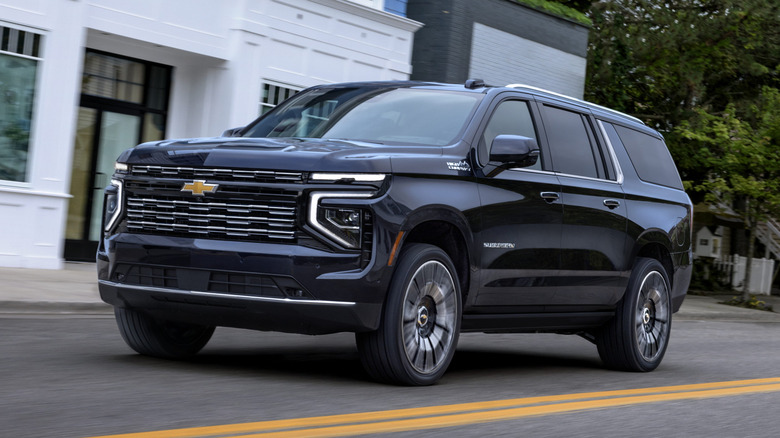Are OEM Oil Recommendations Influenced By EPA Rules? Here's What One Expert Has To Say
Here at SlashGear we advise following engine oil grade and classification recommendations in your vehicle's owner's manual. This holds true even with a high-mileage engine, where experts recommend using a high-mileage oil, with its specialized additives, rather than switching to thicker oil. The OEM (original equipment manufacturer) oil recommendation is almost invariably a safer bet than any advice you may glean from your Uncle Bob or a random stranger online.
But a recent take from Lake Speed Jr., presenter of The Motor Oil Geek channel on YouTube, has given us pause for thought. Speed raises some legitimate concerns and a serious question about these OEM oil recommendations: are manufacturers deliberately and disingenuously recommending low-viscosity oil in their engines in order to meet Environmental Protection Agency (EPA) regulations? Speed contends that a recent General Motors engine recall is evidence this may be the case.
In a recent YouTube video with the polemical title "Stop Following OEM Oil Advice," Speed says the recall — which instructs dealers to swap out the factory-recommended 0W20 oil for a thicker 0W40 grade — blows up the online myth that you can't use an oil viscosity higher than the OEM recommendation. Speed also questions why low-viscosity oils are specified for the U.S. market, when in countries where there is no EPA, and no corporate average fuel economy targets to be hit, owner's manuals — for the exact same engines — routinely recommend higher viscosity oils.
Higher weight oil is a Band-Aid fix
In his video, Speed analyzes the recall notice issued by General Motors on its 6.2-liter L87 engine, which impacts a range of 2021-2024 Chevys, GMC, and Cadillac trucks and SUVs. GM issued the recall in June 2025, after owners reported troublesome powertrain problems, up to and including total engine failure. GM is asking its dealerships to perform checks on the crankshafts of 587,630 vehicles. Those that pass are refilled with a higher-weight oil, with an addendum to the owners manual to list the new recommendation.
"These engines called for 0W20 from the factory," Speed says. "With this recall they are changing for 0W40." He says the fix, which increases oil film thickness at the crank, is a "Band-Aid." "It's giving their engines a better chance to live," he says, citing the NHTSA recall report that showed two factors had contributed to the issue: sediment in the conrod and crank oil galleries (these were nearly new GM models, too, with low mileage) and a roughly finished crankshaft surface. "If you don't have enough film thickness, you are going to have a bearing failure," Speed says.
Speed is not your average podcast pundit, throwing conspiracy theories around for the sake of subscribers and likes. He has formulated oil for winning NASCAR teams, holds multiple certifications with the Society of Tribologists and Lubrication Engineers, and worked alongside GM and Oak Ridge National Laboratory to study low-viscosity oils as a means of improving fuel economy. His motto is "science, not speculation."
False economy at the cost of longevity?
A higher viscosity oil will better protect an engine as it operates under increasing speed, load, and temperature. So why would GM recommend a lightweight oil at the factory, only to switch its recommendation to a heavier oil after disaster strikes? When a car brand's reputation for reliability is at stake, what could possibly be the trade-off for taking that risk? Speed thinks he knows the answer.
"With that test we did with GM and Oak Ridge — putting a 0W12 in that engine that even though it called for a 5W30, we improved the fuel economy in the EPA drive cycle," Speed reveals. Lighter-weight engine oil equals lower drag and higher efficiency, especially in stop-start driving around town — but this potentially comes at the cost of wear and tear on the engine. Nevertheless, oil viscosities are trending downwards — all in pursuit of more miles per gallon.
The 0W-20 weight oil is becoming increasingly commonplace in the automotive sector. Some vehicles have an OEM recommendation of 0W-8 engine oil, even as owners complain it is overly expensive and difficult to find. But thinner oils circulate around teh engine more readily, helping manufacturers meet the U.S. government fuel-efficiency standards for modern vehicles. "The reason for that change in going to the 0W20, 0W16, 0W12, 0W8 — like in my daughter's car — is because of fuel economy," Speed maintains. His analysis is food for thought: should meeting EPA requirements come at the cost of a driver's prematurely worn-out engine?


